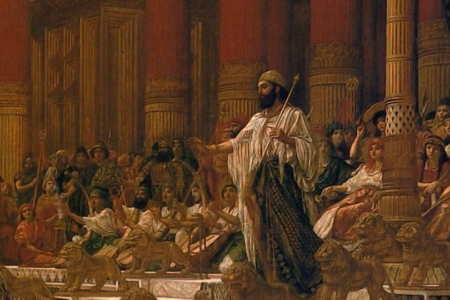Paul’s Final Words
2 Timothy 4:16–22
Place yourself in the apostle Paul’s sandals: You are in a dungeon awaiting execution, knowing your fellow workers face great persecution from Roman officials and opposition from Jewish leaders. Timothy, your beloved son in the faith, might not arrive before your execution. You want your final words to encourage him and others who will read your epistle to him. How would you conclude your letter? Here is how Paul concluded his.
Paul Forsaken
Concerning his trial, Paul said, “At my first defense no one stood with me, but all forsook me. May it not be charged against them” (2 Tim. 4:16). Some scholars believe Paul was referring to his first trial before Emperor Nero several years prior to his upcoming trial. The phrase at my first defense is a technical term used in Greek courts concerning defense proceedings. Paul was saying he had to be his own defense lawyer because no one testified on his behalf.
Fellow believers in Rome could have testified, but it was dangerous to do so because Christianity was outlawed. His witnesses could have been arrested and cast into prison, where they would face the same fate as Paul. In his first trial, Paul answered the false charges, was set free, and continued to preach the gospel. The Lord had given him the words to defend himself.
Other scholars believe Paul was referring to his upcoming trial in Rome following his second arrest. This trial would begin with a preliminary hearing, where the charge against him would be read. He could then provide a defense through witnesses on his behalf. Because his friends and fellow believers feared to testify, he had to defend himself. Yet, the apostle said, “May it not be charged against them” (v. 16).
We do not have enough evidence to be certain if Paul was referring to his first or second trial. Most scholars believe he meant his second trial because he was certain he would be found guilty and executed. Like Stephen before him and in the spirit of Christ, Paul asked the Lord to forgive those who failed to testify of his innocence (cf. Acts 7:59–60).
Paul’s Faith
Though no one came to Paul’s defense, the Lord was with him: “But the Lord stood with me and strengthened me, so that the message might be preached fully through me, and that all the Gentiles might hear. Also I was delivered out of the mouth of the lion” (2 Tim. 4:17). Paul received strength and power through the Holy Spirit to effectively and boldly present his own defense before Nero and the court.
In fact, the Lord had already prepared Paul for his trial, even mentioning Caesar to him by name when the ship transporting Paul to Rome as a prisoner encountered a treacherous storm and ran aground on the island of Malta. An angel assured Paul all 276 aboard would survive: “Do not be afraid, Paul; you must be brought before Caesar” (Acts 27:24).
Much earlier, at Paul’s conversion, the Lord called Paul “a chosen vessel of Mine to bear My name before Gentiles, kings, and the children of Israel. For I will show him how many things he must suffer for My name’s sake” (9:15–16). Notice, the Lord forewarned Paul he would face persecution.
Paul reminded Timothy, “I was delivered out of the mouth of the lion” (2 Tim. 4:17). The apostle did not mean he was delivered from death, a second trial, or literal lions. He simply meant that at the preliminary hearing, he was rescued from death because no verdict was handed down. But he knew his death was imminent (2 Tim. 4:6).
Paul wrote, “And the Lord will deliver me from every evil work and preserve me for His heavenly kingdom” (v. 18). The word evil refers to the spiritual battles he had fought in this satanic world system.
This was not the first time Paul had experienced God’s strengthening. While writing to the Philippians from prison, the apostle said, “I can do all things through Christ who strengthens me” (Phil. 4:13). He knew what he was saying. For example, in Corinth, when the Jews rejected his message and he turned to evangelize the Gentiles, the Lord told him in a night vision, “Do not be afraid, but speak, and do not keep silent; for I am with you, and no one will attack you to hurt you” (Acts 18:9–10).
Reflecting on dying and being with Jesus, Paul declared, “To Him be glory forever and ever. Amen!” (2 Tim. 4:18). He had lost sight of Earth, with its evils and conflicts, and fixed his heart and mind on the joy and unspeakable glory awaiting him after death (1 Pet. 1:8).
Paul’s Friends
Before concluding his farewell epistle, the apostle greeted several close friends in the ministry; and some mutual friends in Rome sent their greetings to Timothy (2 Tim. 4:19–21).
Prisca [Priscilla] and Aquila (v. 19). Mentioning them six times in his epistles, Paul honored this remarkable couple that was so faithful with him in the work (Acts 18:18, 26). They were Jewish believers in Jesus who settled in Corinth after Emperor Claudius commanded all Jews to leave Rome. They were tentmakers like Paul and helped him evangelize Corinth during his second missionary journey. They also accompanied him to Syria, then Ephesus, and stayed there while Paul went to Jerusalem (vv. 1–3, 18–21). Priscilla and Aquila often risked their lives in Paul’s ministry. A church also met in their home (Rom. 16:3–5).
Onesiphorus (2 Tim. 4:19). He and his household helped Paul minister in Ephesus. Onesiphorus also traveled to Rome to visit Paul in prison (1:16–18).
Erastus (4:20). Not much is known about him, only that he was the treasurer of Corinth and was led to Christ by Paul (Rom. 16:23), who sent him with Timothy to minister in Macedonia while Paul stayed in Asia (Acts 19:22).
Trophimus (2 Tim. 4:20). He ministered faithfully with Paul and accompanied him to Jerusalem (Acts 20:4–5). Jewish leaders falsely accused Trophimus, a Gentile, of being brought into the Temple’s inner court (21:29), which was for Jewish people only. Paul left Trophimus sick at Miletus, 36 miles south of Ephesus.
Notice, Paul, who had the gift of healing, did not heal Trophimus. Nor did Paul heal Timothy from frequent stomach infirmities but told him to drink a little wine instead of water for his stomach (1 Tim. 5:23). It is not always God’s will to heal believers even though people pray fervently for their healing.
Paul sent greetings to Timothy from Eubulus, Pudens, Linus, and Claudia, who were committed believers in Rome. Nothing else is said about them. He added, “all the brethren” (2 Tim. 4:21). History reveals that the Christians in Rome, although under extreme persecution by Nero, did survive.
Jesus promised the church will survive: “I will build My church, and the gates of Hades shall not prevail against it” (Mt. 16:18).
Again, Paul urged Timothy to hurry to Rome: “Do your utmost to come before winter” (2 Tim. 4:21). To see Paul alive, Timothy had to leave immediately. With winter approaching, Paul knew the journey would be difficult; and when Timothy arrived in Rome, he could face Nero’s persecution. Thus, Timothy needed the Lord’s protection. Scripture never reveals if he made it in time.
Paul’s Farewell
Paul concluded this letter—his final epistle—simply and appropriately: “The Lord Jesus Christ be with your spirit. Grace be with you. Amen” (v. 22). Not only Timothy but all Christians needed God’s grace during the early days of the church, just as we need it today.
Paul knew well the grace of God through his life and ministry. Grace washed away his sins, called him to serve Jesus, and protected him through many perils. Grace allowed him to bring hundreds to saving faith in Christ, helped him face a martyr’s death, and guided him to pen this wonderful epistle to fortify and encourage everyone who reads it to serve the Lord.
The curtain is now closed on the apostle Paul’s life. Friend, take to heart Paul’s final words, and apply them to your life as you serve the Lord in these difficult times. God’s grace be with you!
Editor’s Note: This concludes David Levy’s series on 2 Timothy. In the next issue, he will begin a series on the book of Philippians, an epistle of joy and rejoicing.








